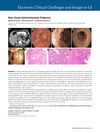 November 2024 in “Journal of Education Health and Sport”
November 2024 in “Journal of Education Health and Sport” Microneedling, PRP therapy, and pharmacological treatments show promise for hair loss, but more research is needed.
January 2018 in “Indian Dermatology Online Journal” A child with Olmsted syndrome showed mild improvement in hair and skin issues with treatment.
 April 2023 in “Journal of Investigative Dermatology”
April 2023 in “Journal of Investigative Dermatology” Weight loss surgery improved several skin conditions in obese patients but often caused hair loss.
 August 2013 in “Gastroenterology”
August 2013 in “Gastroenterology” A 60-year-old man with Cronkhite-Canada syndrome improved with treatment, but the condition has a high mortality rate and a risk of colorectal cancer.
 1 citations,
January 2020 in “Indian Dermatology Online Journal”
1 citations,
January 2020 in “Indian Dermatology Online Journal” Pigtail hair is a sign of new hair growth and should be recognized in hair loss conditions like acute telogen effluvium.
 105 citations,
January 2010 in “Mediators of Inflammation”
105 citations,
January 2010 in “Mediators of Inflammation” Skin surface lipids are important for skin health and altering them could help prevent aging and treat skin conditions.
 30 citations,
July 2010 in “Experimental Dermatology”
30 citations,
July 2010 in “Experimental Dermatology” Polyamines are important for hair growth, but more research is needed to understand their functions and treatment potential.
 38 citations,
January 2015 in “Journal of Cosmetic Dermatology”
38 citations,
January 2015 in “Journal of Cosmetic Dermatology” The nutritional supplement improved hair density and reduced hair loss in women with female pattern hair loss.
 7 citations,
February 2018 in “Australian Prescriber”
7 citations,
February 2018 in “Australian Prescriber” Some sports supplements can cause health issues like mood swings, hair loss, and heart problems in men.
 December 2018 in “Journal of Patan Academy of Health Sciences”
December 2018 in “Journal of Patan Academy of Health Sciences” Many Chinese patients lose hair after weight loss surgery, especially women, and taking iron and zinc on their own doesn't help.
 78 citations,
December 2011 in “Clinical toxicology”
78 citations,
December 2011 in “Clinical toxicology” Excessive selenium from a supplement caused toxicity but patients recovered with care.
 25 citations,
January 2017 in “International Journal of Trichology”
25 citations,
January 2017 in “International Journal of Trichology” Most Indian people with hair loss in the study lacked nutrients, especially iron.
 5 citations,
December 2020 in “BMC Dermatology”
5 citations,
December 2020 in “BMC Dermatology” Bariatric surgery improves skin conditions and metabolism but may cause nutritional deficiencies and hair loss.
 10 citations,
August 2021 in “Journal of Cosmetic Dermatology”
10 citations,
August 2021 in “Journal of Cosmetic Dermatology” Most patients with telogen effluvium had low iron and vitamin D levels; iron supplements were commonly prescribed.
 January 2023 in “Dermatologic Therapy”
January 2023 in “Dermatologic Therapy” The nutritional supplement Pilopeptan® WOMAN improved hair growth and thickness in women with hair loss.
76 citations,
April 2002 in “Urology” Selenium and vitamin E supplements have mixed effects on prostate cancer risk and may not be beneficial for everyone.
 December 2023 in “Research in pharmacy”
December 2023 in “Research in pharmacy” Phytotherapeutic compounds and supplements can help manage Polycystic Ovarian Syndrome (PCOS).
 June 2023 in “JAAD international”
June 2023 in “JAAD international” Patients with skin of color are more likely to use supplements for hair loss than Caucasian patients, but the effectiveness of these supplements is uncertain and they can be expensive.
 December 2024 in “Cureus”
December 2024 in “Cureus” Chemotherapy worsens nutritional status in breast cancer patients, requiring targeted nutritional strategies.
 January 2020 in “Asian journal of applied science and technology”
January 2020 in “Asian journal of applied science and technology” Good nutrition is crucial for health and preventing disease, and supplements can help prevent nutrient deficiencies.
 79 citations,
January 2017 in “Dermatology practical & conceptual”
79 citations,
January 2017 in “Dermatology practical & conceptual” Correcting nutrient deficiencies may help with hair loss, but the benefits of supplements without a deficiency are uncertain and could be harmful.
 7 citations,
May 2016 in “SpringerPlus”
7 citations,
May 2016 in “SpringerPlus” Some breast cancer patients on hormone therapy experience hair loss, and treatments like certain topical inhibitors and supplements may help without harming their cancer prognosis.
 3 citations,
November 2020 in “Biological Trace Element Research”
3 citations,
November 2020 in “Biological Trace Element Research” Men with hair loss may lack zinc, copper, and vitamin D; supplements could help.
 71 citations,
January 2016 in “International Journal of Trichology”
71 citations,
January 2016 in “International Journal of Trichology” Biotin deficiency is not a major cause of hair loss in women, so biotin supplements are not likely to be an effective hair loss treatment.
 December 2020 in “Journal of Pakistan Association of Dermatology”
December 2020 in “Journal of Pakistan Association of Dermatology” COVID-19 recovery can lead to temporary hair loss called telogen effluvium.
 40 citations,
January 2010 in “Indian Journal of Dermatology, Venereology and Leprology”
40 citations,
January 2010 in “Indian Journal of Dermatology, Venereology and Leprology” Certain diets can affect skin conditions, but more research is needed to understand these relationships fully.
 21 citations,
January 2014 in “Dermatology Research and Practice”
21 citations,
January 2014 in “Dermatology Research and Practice” Hair and serum levels of zinc, copper, and iron are similar in people with alopecia areata and healthy individuals.
 7 citations,
January 2017 in “Journal of cosmetology & trichology”
7 citations,
January 2017 in “Journal of cosmetology & trichology” Good nutrition is crucial for healthy hair and can help with hair loss without medication.
 3 citations,
January 2016 in “Journal of cosmetology & trichology”
3 citations,
January 2016 in “Journal of cosmetology & trichology” Taking vitamins, minerals, and amino acids can improve hair strength and quality in people with Monilethrix.
 February 2024 in “Scientific Reports”
February 2024 in “Scientific Reports” Topical minoxidil and dietary supplements improved hair regrowth in children with hair loss from chemotherapy.




























